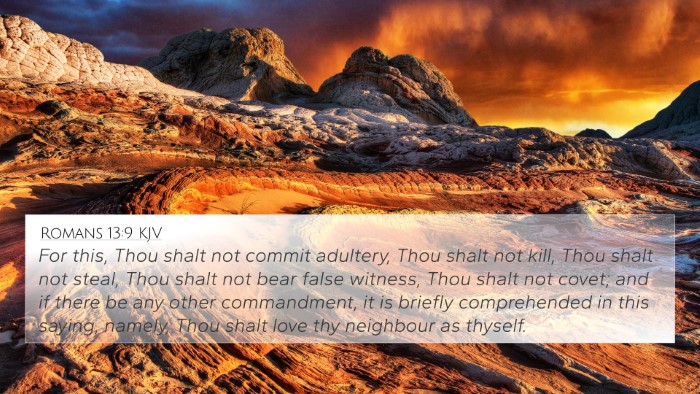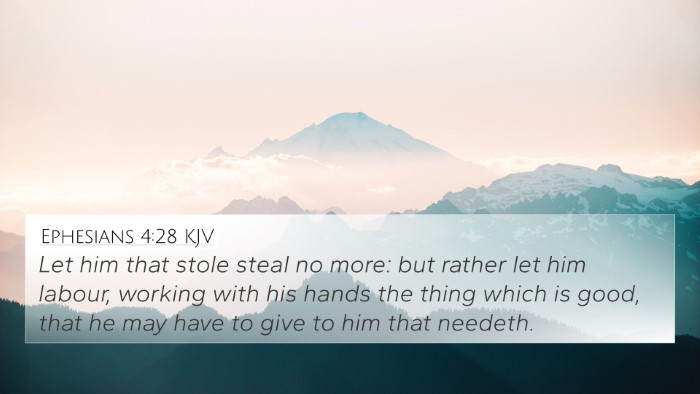Understanding Deuteronomy 5:19
Bible Verse: Deuteronomy 5:19
"Neither shalt thou steal."
Verse Meaning and Insights
Deuteronomy 5:19 forms part of the Ten Commandments, emphasizing the prohibition of theft. This command not only addresses the act of stealing but also enlarges our understanding of respect for others' property and integrity in society. Renowned commentaries shed light on its depth:
Matthew Henry's Commentary
Matthew Henry emphasizes the importance of this command in promoting social justice and harmony. He notes that theft is not merely a physical act but reflects a deeper moral failing. He highlights that stealing violates a person's trust and undermines the social fabric necessary for a thriving community.
Henry points out that God's directives protect both the individual and the communal well-being, creating a society where property rights are respected.
Albert Barnes' Commentary
Albert Barnes elaborates on the broader implications of theft. He asserts that this commandment teaches us about the nature of ownership and the sanctity of personal property. Barnes connects this principle to the teachings of Jesus, reinforcing that the intent of the law goes beyond the physical act of stealing to include desire and intent.
He also notes the restorative aspect of this command, suggesting that in urging people not to steal, God encourages them to engage in honest work and trade, thereby promoting economic integrity.
Adam Clarke's Commentary
Adam Clarke accepts this commandment as foundational for moral conduct. He outlines that stealing not only harms individuals but can also lead to societal unrest. Clarke highlights the distinction between theft and legitimate trade, emphasizing the ethical dimension in handling resources.
Furthermore, Clarke asserts that understanding this commandment requires an awareness of our responsibilities toward communal assets and the need for mutual trust within society.
Related Bible Verses and Cross-References
- Exodus 20:15: "Thou shalt not steal." - This passage mirrors Deuteronomy 5:19 and reinforces the commandment against stealing.
- Leviticus 19:11: "Ye shall not steal, neither deal falsely, neither lie one to another." - Highlights the broader ethical implications of theft.
- Luke 19:8: "And Zacchaeus stood, and said unto the Lord: Behold, Lord, the half of my goods I give to the poor; and if I have taken anything from any man by false accusation, I restore him fourfold." - Demonstrates a proper response to theft and repentance.
- Ephesians 4:28: "Let him that stole steal no more: but rather let him labor, working with his hands the thing which is good, that he may have to give to him that needeth." - Encourages positive actions instead of theft.
- Proverbs 30:9: "Lest I be full, and deny thee, and say, Who is the Lord? or lest I be poor, and steal, and take the name of my God in vain." - Warns against the spiritual consequences of theft.
- 1 Corinthians 6:10: "Nor thieves, nor covetous, nor drunkards, nor revilers, nor extortioners, shall inherit the kingdom of God." - Indicates the spiritual repercussions of stealing.
- Matthew 19:18: "He saith unto him, Which? Jesus said, Thou shalt do no murder, Thou shalt not commit adultery, Thou shalt not steal, Thou shalt not bear false witness." - Reiterates the importance of these moral laws in the New Testament.
Thematic Connections and Insights
Deuteronomy 5:19 is integral in the framework of biblical ethics, connecting to various themes such as justice, integrity, and community relationships. The inter-Biblical dialogue presented through the cross-references enriches our understanding:
- Justice and Integrity: The repeated calls against theft in scripture emphasize that justice includes respect for what belongs to others.
- Restoration and Repentance: The story of Zacchaeus demonstrates that acknowledging wrongs and making amends is a central tenet of biblical morality.
- Community Trust: The condemnation of theft strengthens the moral and ethical standards vital for community cohesion.
Cross-Referencing Biblical Texts
This commandment interacts with both Old and New Testament teachings, enhancing the understanding of theft and property rights. Utilizing tools for Bible cross-referencing, one could explore:
- Identifying connections between the Old and New Testament: Recognizing how commandments from the Law inform New Testament teachings.
- Dive into comparative Bible verse analysis: Analyzing how different authors address the concept of theft.
- Utilizing a Bible concordance or cross-reference guide: To find related verses addressing the themes of justice, property, and ethics.
Conclusion
Deuteronomy 5:19 stands as an enduring commandment that shapes moral understanding and societal interaction. Studying its implications through various commentaries and cross-referencing with related scripture provides a rich tapestry of meaning. This verse encourages individuals to maintain integrity while fostering mutual respect within communities.
Call to Action: Exploring Bible Cross-References
To deepen your understanding of Scripture, explore the interconnectedness of various verses and their thematic implications through tools for Bible cross-referencing. Whether preparing for a sermon or seeking personal study, leveraging these resources can enrich your spiritual journey.





